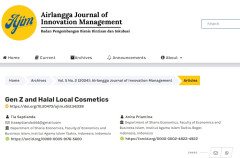Filter by

Pengaruh Tingkat Literasi Pariwisata Halal, dan Perilaku Wisatawan Terhadap M…
Abstract This research aims to analyze the effect level of halal tourism literacy and tourist behavior towards interest in visiting halal tourism with a focus on halal tourism in Riau Province. This research uses the PLS-SEM (Partial Least Square Structural Equation Modeling) method to illustrate the results of regression analysis related to testing the relationship between independent and dep…
- Edition
- Volume 9, No 1 Juni 2024
- ISBN/ISSN
- 2540-9506
- Collation
- ES
- Series Title
- pp. 110-126
- Call Number
- -

Label Halal dan Pengetahuan Terhadap Keputusan Konsumen Menggunakan Produk Ko…
Abstract Penelitian ini bertujuan untuk mengetahui dampak label halal dan pengetahuan terhadap keputusan pembelian produk kosmetik halal pada generasi Z di wilayah Jabodetabek. Metode penelitian yang digunakan adalah kuantitatif dengan pengumpulan data primer melalui kuisioner yang di isi oleh responden, terkait label halal dan pengetahuan terhadap keputusan konsumen menggunakan produk kosmeti…
- Edition
- vol.14 No. 2
- ISBN/ISSN
- 2655-206X
- Collation
- ES
- Series Title
- pp. 180-190
- Call Number
- -

Analisis Pengaruh Harga, Kualitas, dan Label Halal, Terhadap Minat Beli Mahas…
Abstract The aim of this research is to analyze the influence of price, quality and halal label variables on consumer purchasing interest in local cosmetics. The research method applied was quantitative, where questionnaires were distributed to 107 Muslim students from various universities in Indonesia using a purposive sampling technique. Data was collected via Google Forms and analyzed using…
- Edition
- VOL.5 No.9
- ISBN/ISSN
- 2747-0490
- Collation
- ES
- Series Title
- pp. 3675-3692
- Call Number
- -

Gen Z and Halal Local Cosmetics
This research aims to determine the influence of the halal label, knowledge and religiosity on local cosmetics labeled halal. Looking at the surrounding environment, many generation Z people still don't care about choosing local cosmetics that are labeled halal. Apart from that, this research advises consumers or cosmetic users to be careful in choosing the cosmetic brands they use, especially …
- Edition
- Vol. 05 No.02 (2024)
- ISBN/ISSN
- 2722-5062
- Collation
- ES
- Series Title
- pp.201-214
- Call Number
- -

Pengaruh Label Halal, Harga dan Kualitas Pelayanan Terhadap Keputusan Pembeli…
Abstract This study aims to analyze the influence of halal labels, price and service quality on drug purchasing decisions among students at the Tazkia Bogor Islamic Institute. Considering that the majority of Indonesia's population is Muslim, the halal label is an important factor in product purchasing decisions, including medicines. This research uses quantitative methods by collecting primar…
- Edition
- Vol 3 No 1 (2024)
- ISBN/ISSN
- 2656-4351
- Collation
- ES
- Series Title
- -
- Call Number
- pp. 6189-6201

Pengaruh Literasi Halal, Religiusitas, Halal Awareness Terhadap Minat Beli Ko…
Abstract This research aims to investigate the influence of halal literacy, religiosity, and awareness of halal on consumer buying interest in halal certified restaurants in the Jabodetabek area, with a focus on Generation Z. Data was collected through a survey targeting 162 respondents using a scale of 1 to 6. Testing was carried out using the Smart PLS V.3 analysis tool and the Structural Eq…
- Edition
- Vol 6 No 10 (2024)
- ISBN/ISSN
- 2656-4351
- Collation
- ES
- Series Title
- pp. 1580 – 1600
- Call Number
- -
Faktor- Faktor Yang Mempengaruhi Preferensi Halal Pada Produk Kosmetik Di Ka…
Abstract The aim of this study is to analyse the influence of attitudes, subjective norms and religiosity on halal preferences for cosmetic products, with a focus on Generation Z. Using a quantitative method with an SEM-PLS approach, this study collected primary data from Generation Z respondents who purchased halal cosmetic products. The analysis shows that attitudes, subjective norms and r…
- Edition
- Vol. 10 No. 1 Maret 2024
- ISBN/ISSN
- 2621-668X
- Collation
- pp.80-95
- Series Title
- -
- Call Number
- -

How Perceived Value Mediates Muslim Consumer Loyalty to Halal Cosmetics: An A…
Introduction: Community productivity is critical in maintaining quality of life to avoid disasters. The use of digital technology in the economic aspect has also provided opportunities for people far from the market to earn income to meet their living needs. Objective: This quantitative study aimed to explore the impact of halal labeling, price, and product quality on consumer loyalty toward In…
- Edition
- Vol. 6 No. 02
- ISBN/ISSN
- 2442-3076
- Collation
- -
- Series Title
- -
- Call Number
- -

Pengaruh Fitur Muslim Friendly terhadap Perilaku Pelanggan Airbnb (The Impact…
This research aims to analyze the influence of halal attributes, such as halal social environment, halal facilities, halal food and beverages, and services and staff of hotels or guesthouses, which are grouped into one variable, namely cognitive assessment, on consumer intention to visit, consumer willingness to pay, and WOM through Affective Assessment.
- Edition
- Vol 5, No 3,
- ISBN/ISSN
- 2716-0807
- Collation
- -
- Series Title
- -
- Call Number
- -

Do Halal Literacy, Religiosity and Legal Compliance Affect The Motivation of …
he enactment of regulations regarding the obligation to guarantee halal products in Indonesia according to Law Number 33 2014 is mandatory and binds for SMEs owners to have halal guarantees for all products that are offered. However, the number of Indonesian SMEs that have been halal-certified remains very low and far from their potential. The purpose ofthis study was to analyze the effect…
- Edition
- Vol. 11 No. 2
- ISBN/ISSN
- 2442-3076
- Collation
- -
- Series Title
- -
- Call Number
- -
 Computer Science, Information & General Works
Computer Science, Information & General Works  Philosophy & Psychology
Philosophy & Psychology  Religion
Religion  Social Sciences
Social Sciences  Language
Language  Pure Science
Pure Science  Applied Sciences
Applied Sciences  Art & Recreation
Art & Recreation  Literature
Literature  History & Geography
History & Geography